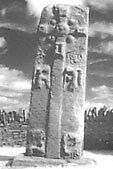|
SCOTTISH HISTORY & HERITAGE
The People
Scotland had four main people. The Picts ruled the north, east and most of central Scotland. Originally coastal people like so many other early Celtic settlers left no written language, however, they did leave ornate symbols on stone proof of a cultured people and an older race than the Irish or the Scots.
 The Britions dominated west of lower Scotland and top portion of England. The Angles settled in the southeast of Scotland and the top of England, - warlike and greedy they drove the Britons out of surrounding land and carved a kingdom for themselves. The Britions dominated west of lower Scotland and top portion of England. The Angles settled in the southeast of Scotland and the top of England, - warlike and greedy they drove the Britons out of surrounding land and carved a kingdom for themselves.
Lastly the fourth tribe were also known as a ferocious warlike race these were the Scots, descended from Ireland. The name Scot is believed to be a corrupted form of Scottus or Scotti, which means raiders. Dalriada was the Scots kingdom, which stretched from east Ireland through the Western Isles to Argyll.
Mid 9th centaury the Vikings had moved into the Pictish kingdom and attacked the Scots in the Kingdom of Dalriada. The Scots moved inland and with the southern Picts created a kingdom called Alba with Scone as its capital. On the Stone of Scone Kenneth MacAlpin King of Scots was made King of Picts. The famous stone had very religious ancestry to the Scots dating back to the 6th 7th Centuary the stone was said to have been brought by Fergus to Dalriada to crown the Kings of Scots.
Religion
Much of Scotland became Christian long before England. Due initially to an ordained Monk named Ninian (a Briton). Ninians followers may have taken their new faith as far north as the Shetlands. The Scots of Dalriada had Irish missionaries of their own St Columba arrived in Scotland form Ireland in around 563AD. He had influence and helped the Scots establish western Scotland as an independent Kingdom. Irish Monasticism and traditional Celtic lore became the new faith. The Roman Catholic Church, of course would not tolerate this.
In 732 the bones of St Andrew were brought to Scotland. One of the Twelve Apostles, Andrew became Scotlands Patron Saint. Brought to the heart of Pictland - the town that later became the Cathedral town of St Andrews.
In future centuries religion was to become a thorn in Scotlands side and be at the heart of many battles.
|



